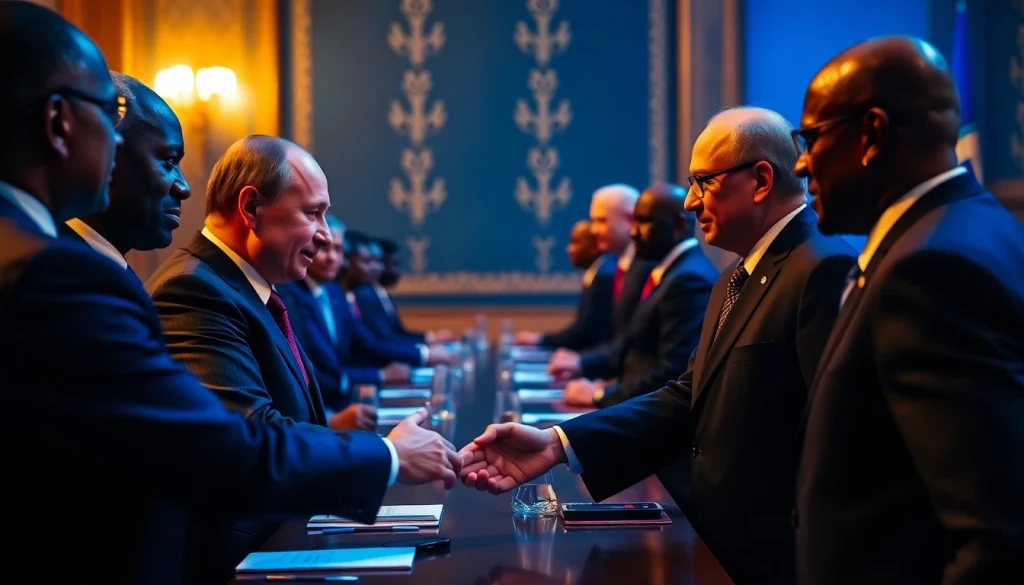The Dynamic Shift in Russia Africa Relations: A New Era of Cooperation and Growth

Understanding Russia Africa Relations
The relationship between Russia and African nations has evolved significantly in recent years, influenced by shifting geopolitical dynamics and rising economic interests. Countries across Africa are increasingly positioning themselves at the forefront of global diplomatic negotiations and economic partnerships. The interactions between Russia and Africa represent a multifaceted approach, encompassing historical ties, economic opportunities, and cultural exchanges. This article delves into the Russia Africa relations and what they mean for both parties in the contemporary landscape.
Historical Context of Diplomatic Ties
Historically, Russia’s relationship with African nations can be traced back to the Cold War era, when the Soviet Union sought to expand its influence through support for various liberation movements and political ideologies. These interactions were largely motivated by a desire to challenge Western hegemony and promote socialist governance models. As the Cold War came to an end, Russia’s engagement in Africa dwindled but has seen a remarkable resurgence in recent years as the Kremlin seeks to reassert its global influence.
Current Motivations Behind Russia’s Influence in Africa
Today, Russia’s motivations for strengthening ties with African nations are diverse and strategic:
- Access to Natural Resources: Africa is rich in minerals, oil, and gas reserves, which are critical for Russia’s energy security and economic growth.
- Military Partnerships: Moscow is increasingly supplying arms and military training to various African governments, helping them combat terrorism and insurgencies.
- Political Alliances: Establishing a network of allies in Africa helps Russia counterbalance Western influence on the continent.
- Economic Cooperation: Through trade agreements and mutual investments, Russia aims to create economic opportunities that benefit both its interests and those of African nations.
Key Players and Their Roles in Strengthening Relations
Several key players are instrumental in enhancing Russia’s presence in Africa:
- Government Officials: Leaders, such as Russian President Vladimir Putin, play a critical role by participating in high-level summits and fostering bilateral relations.
- Private Enterprises: Russian companies like Gazprom and Rosneft engage directly with African governments to facilitate energy and infrastructure projects.
- Military Contractors: Organizations such as the Wagner Group operate in various African countries, providing security services while strengthening Russia’s strategic foothold.
- Diplomatic Missions: Russia’s embassies and consulates across Africa serve as platforms for dialogue and cooperation initiatives.
Economic Implications of Russia’s Engagement in Africa
Investment Opportunities and Trade Agreements
The economic landscape is a cornerstone of Russia’s engagement in Africa. Investment opportunities abound as African nations endeavor to modernize their economies and infrastructural capabilities. For example, Russia has made significant investments in sectors ranging from mining to agriculture. Trade agreements facilitate the flow of goods between Russia and African nations, exemplified by recent deals involving arms, energy resources, and agricultural products.
Energy Projects: A Collaborative Approach
Energy cooperation is particularly crucial. Russia, as one of the world’s leading oil and gas producers, seeks to extend its influence through joint ventures in energy exploration and extraction. Projects like the construction of oil refineries and natural gas pipelines are fundamental in enhancing energy security for both Russia and African countries.
Evaluation of Economic Benefits for African Nations
The economic benefits for African nations are significant. Enhanced investments and technology transfers can drive economic growth, create jobs, and promote local enterprises. The establishment of free trade zones and the removal of tariffs for joint projects can further bolster bilateral trade, offering African nations new platforms for expanding their markets abroad.
Geopolitical Dynamics Shaping the Future
The Role of BRICS+ in International Relations
The emerging BRICS+ forum, combining Brazil, Russia, India, China, and South Africa, presents a unique bloc that is gaining traction in reshaping global governance. This coalition aims to present an alternative to Western-dominated global institutions and provide avenues for expanded cooperation among member states and with African partners. The forum’s initiatives create pathways for collaborative projects in technology transfer, infrastructure development, and trade.
Responses from Western Powers: Challenges and Strategies
Western countries have exhibited skepticism towards the deepening Russia-Africa relationship. Several nations have raised concerns over Russia’s military influence and its impact on human rights practices in countries like Libya and the Central African Republic. In response, Western powers are formulating strategies to counterbalance Russia’s influence through increased investments and diplomatic engagement.
Potential Conflicts and Alliances in Africa
The geopolitical landscape in Africa is complex, characterized by a mix of conflict and cooperation. As Russia strengthens ties with various nations, it may inadvertently exacerbate existing tensions, particularly among regional powers. Understanding these dynamics is essential for navigating the future of Russia’s relationships within the context of African geopolitical interests.
Social and Cultural Exchanges Between Russia and Africa
Educational Partnerships and Knowledge Sharing
Social exchanges are equally essential in the context of Russia-Africa relations. Educational partnerships enable student exchanges and academic collaborations that help foster understanding and mutual respect. Russian universities have actively engaged in cooperation with African institutions, bolstering academic and cultural ties.
Tourism Growth: Bridging Cultures
Tourism serves as a conduit for cultural exchange, with growing numbers of tourists traveling between Russia and African nations. Initiatives to promote tourism create opportunities for collaboration in hospitality and service sectors, enhancing the cultural understanding between regions.
Public Perception: Media Representation of Russia in Africa
The perception of Russia in Africa is shaped by media representations and personal experiences. While some view Russia as a partner in development, others remain cautious about its intentions. This dichotomy highlights the importance of effective communication strategies to foster a positive image and dispel misconceptions.
Future Prospects and Challenges Ahead
Long-Term Sustainability of Russia Africa Relations
The sustainability of Russia-Africa relations hinges on several factors, including the alignment of strategic interests and the ability to address common challenges. Long-term success requires a proactive approach to mutual benefits and respect for sovereignty.
Emerging Issues: Human Rights and Governance
As relationships deepen, issues of governance and human rights come to the forefront. Russia’s involvement in various countries may face scrutiny over potential impacts on democracy and human rights standards. Thus, it is crucial for both parties to engage in transparent dialogues addressing these concerns.
Strategies for Robust Bilateral Cooperation Moving Forward
To ensure robust bilateral cooperation, both Russia and African nations should focus on developing frameworks that prioritize equitable economic growth and sustainable development. Initiatives tackling poverty reduction, infrastructure development, and technology transfer are critical for solidifying this partnership.




